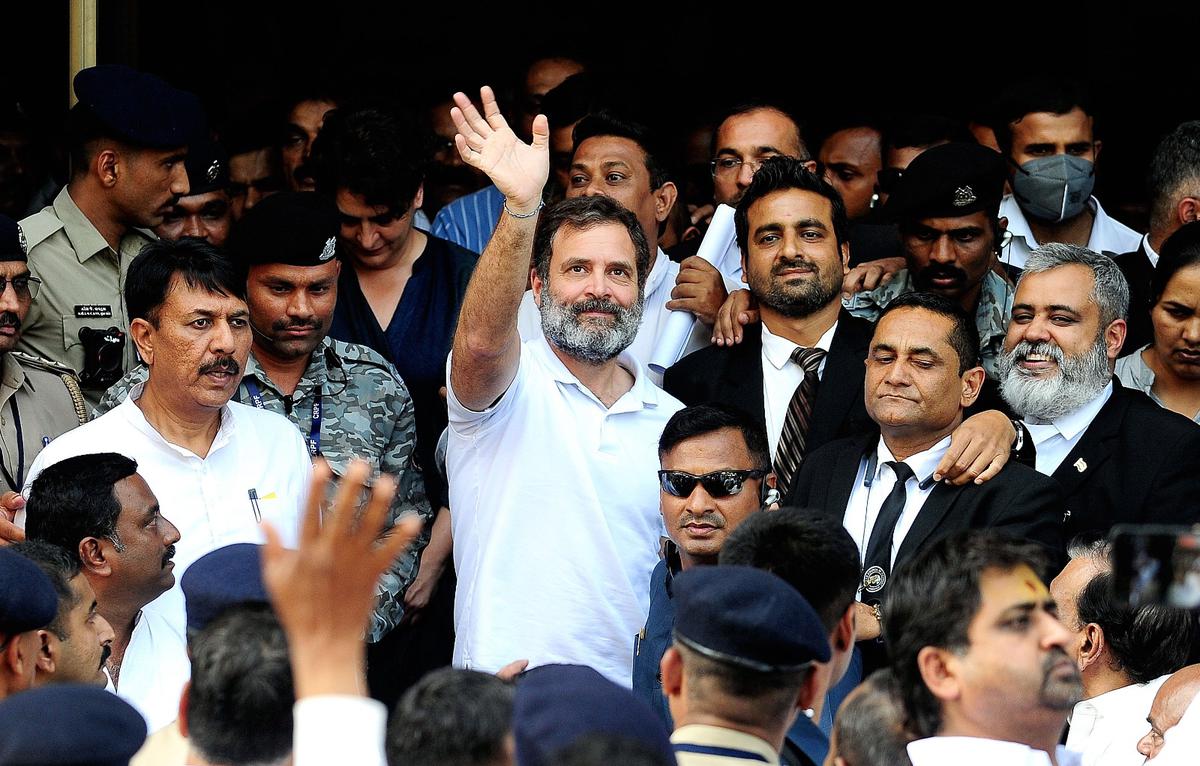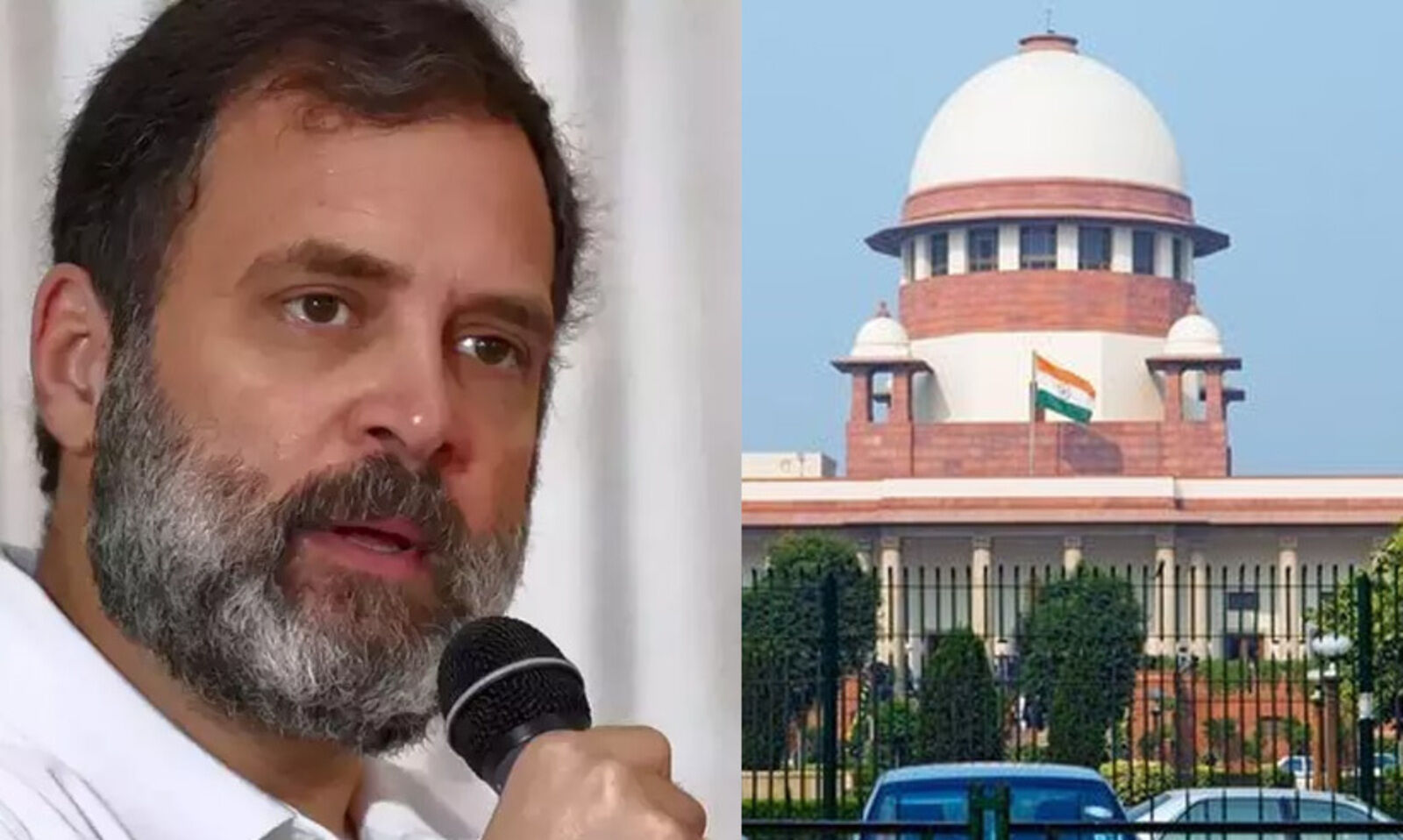Supreme Court issues notice in Rahul Gandhi defamation case, does not entertain request for ‘interim suspension’ of conviction

Supreme Court issues notice in Rahul Gandhi defamation case, does not entertain request for ‘interim suspension’ of conviction
The Supreme Court of India, led by Justice BR Gavai, issued a notice to complainant Purnesh Modi and the State of Gujarat in response to a petition filed by Congress leader Rahul Gandhi. The petition sought a stay of his conviction in a criminal defamation case. The case in question pertains to Mr Gandhi’s “Modi” surname remark made during a political rally in Karnataka in 2019.
Senior advocate A.M. Singhvi and advocate Prasanna S., representing Mr Gandhi, requested an “interim suspension” of the conviction. However, the court refused to grant the request, emphasizing the need to hear both sides before making any decisions.
Justice Gavai expressed his stance, stating that it would be premature to provide an interim suspension without hearing the arguments from the opposing side. The court listed the case for a hearing on August 4, allowing both parties to present their respective positions.
During the proceedings, Mr Singhvi emphasized the case’s urgency, highlighting that 111 days have passed since Mr Gandhi’s disqualification from the House. As a result of the conviction, Mr Gandhi was unable to participate in a parliamentary session, including the ongoing monsoon sitting of the Parliament.

Given the gravity of the situation, Mr Singhvi’s plea for an urgent hearing sought to address the impact of the conviction on Mr Gandhi’s parliamentary engagement. However, the court maintained its stance on ensuring due process and hearing all relevant arguments before considering any suspension of the conviction.
As the case moves forward, the public and media are keeping a close eye on further developments in this matter. The outcome of the hearing scheduled for August 4 will determine the future course of action in this high-profile defamation case involving a prominent political figure like Rahul Gandhi.
During the legal proceedings, when senior advocate Mahesh Jethmalani raised an objection, Mr. Singhvi clarified that Rahul Gandhi’s primary concern was related to the conviction part of the case and not the disqualification part. This indicates that Mr Gandhi’s immediate priority was to seek a stay of his conviction in the criminal defamation case.

Mr Singhvi elaborated on the urgency of the matter by pointing out that by-elections for the Wayanad constituency, from which Rahul Gandhi was disqualified due to his conviction, may be announced at any time. He mentioned that there is a constitutional mandate under Section 151A of the Representation of People Act 1951, which states that a seat should not remain vacant for more than six months.
The reference to Section 151A implies that if the seat remains vacant for more than six months, it could necessitate a by-election to fill the vacant seat. Therefore, Mr Singhvi’s argument likely aimed to stress the importance of resolving the conviction issue promptly to avoid a potential by-election in the Wayanad constituency.
The court’s consideration of these points may influence their decision on the urgency of the hearing and the stay of conviction sought by Rahul Gandhi in the criminal defamation case. As the legal proceedings continue, the public and media will closely monitor further developments.During the legal proceedings, senior advocate Mahesh Jethmalani requested additional time to file written submissions on the “propositions of law and questions of fact” relevant to the case. This indicates that Mr Jethmalani needed more time to present his arguments and legal points on behalf of his client.
Initially, the Bench scheduled the case to be heard within the next 10 days, with a tentative date of July 31. However, after considering the request for more time to prepare written submissions, the court decided to fix the case for hearing on August 4.
Justice Gavai, who was leading the Bench, emphasized the primary question before the court, which is whether the conviction against Rahul Gandhi should be suspended or not. This highlights the central issue that the court needs to address during the upcoming hearing.
With both sides having the opportunity to present their respective arguments and written submissions, the court will carefully assess the legal aspects and facts of the case before making a decision on whether to grant the requested stay of conviction.

As the case is set to be heard on August 4, the public and media will await the court’s verdict on this significant matter involving Rahul Gandhi’s criminal defamation case and its potential implications on his political standing and participation in the parliamentary affairs.
As the hearing began in the case involving Rahul Gandhi’s petition seeking a stay of his conviction in the criminal defamation case, Justice Gavai disclosed his family background to the lawyers involved in the proceedings. He informed them that his father, R.S. Gavai, had a significant political history. R.S. Gavai was an activist, parliamentarian, Governor, and also the founder of the Republican Party of India (Gavai).
Furthermore, Justice Gavai’s disclosure revealed that his brother, Rajendra Gavai, is also actively involved in politics. Rajendra Gavai’s political association adds to the family’s longstanding ties with the political sphere.
By making this disclosure, Justice Gavai demonstrated transparency and ensured that all parties involved were aware of any potential connections or affiliations relevant to the case. Such disclosures are essential in maintaining impartiality and avoiding any perception of bias in the judiciary.
It is not uncommon for judges to recuse themselves from cases if they have any personal or familial associations that could affect their objectivity. However, the final decision on any recusal or continuation of the case would depend on the judge’s assessment and the parties’ acceptance.
As the case progresses, the public and legal community will closely observe the proceedings to ensure that justice is served impartially and fairly.During the hearing of the case involving Rahul Gandhi’s petition seeking a stay of his conviction in the criminal defamation case, Justice Gavai disclosed his family’s history of political association with the Congress party.
He informed the lawyers present, including Mr Jethmalani and Mr Singhvi, that his father had a close association with the Congress party, although he was not a member. Justice Gavai also mentioned that his brother is currently involved in politics and is associated with the Congress party.
Justice Gavai, recognizing the potential implications of his family’s political connections, offered to recuse himself from the case if the lawyers believed it necessary. However, both Mr Jethmalani and Mr Singhvi requested him not to recuse himself.
Mr Singhvi commented on the prevailing trend of raising such matters and highlighted that there should not be unnecessary concerns about the judge’s impartiality.
In response, Justice Gavai clarified that he disclosed the information to avoid any issues later on and asserted that his judgments have never been affected by such personal matters during his 20 years on the Bench.
By making the disclosure and offering to recuse himself, Justice Gavai demonstrated his commitment to transparency and upholding the principles of a fair and impartial judiciary.
Ultimately, both sides expressed confidence in his ability to preside over the case impartially, allowing the proceedings to continue without any further concerns about potential bias.During the hearing, Justice Gavai humorously mentioned that his father had friendly relations with the fathers of both Mr Singhvi and Mr Jethmalani when they were fellow parliamentarians, adding a lighthearted element to the proceedings.
In his petition seeking a stay of his conviction in the criminal defamation case, Mr Gandhi contended that the lower courts had deemed his political speech as an act of “moral turpitude.” He argued that his speech, which criticized economic offenders and Prime Minister Narendra Modi, was merely a part of democratic political activity and should not be considered a morally reprehensible act.
Mr Gandhi’s petition emphasized the importance of democratic free speech during political campaigns and expressed concerns that branding political speech as morally wrong could set a dangerous precedent. He asserted that such a precedent would hinder political dialogue and debate, especially when it involves any form of legitimate criticism.
By making these arguments in his petition, Mr Gandhi aimed to highlight the significance of safeguarding free speech and preserving the essence of democratic discussions and debates within the realm of politics.
As the case progresses, the court will consider Mr Gandhi’s contentions along with the arguments presented by the defence and other parties involved.
The final decision will have implications not only for Mr Gandhi but also for the broader political landscape concerning the scope and protection of political speech in democratic societies.In his petition seeking a stay of his conviction in the criminal defamation case, Rahul Gandhi argued that the two-year sentence, which represents the maximum punishment under defamation law, would lead to his exclusion from all political elective offices for a substantial period of eight years. This highlights the severe consequences of the conviction on his political career.
Mr Gandhi challenged the decision of the Gujarat High Court, which upheld his conviction on July 7. He questioned the basis of how an “undefined amorphous group” could be defamed in the first place. By raising this point, he sought to challenge the legitimacy of the defamation charges against him and the applicability of defamation laws in the given context.
The concept of defaming an “undefined amorphous group” raises questions about the specificity of the alleged defamation and whether it is possible to defame a group without clearly identifying its members or characteristics.
By presenting these arguments in his petition, Mr Gandhi aimed to establish that his political speech, critical of economic offenders and Prime Minister Narendra Modi, was made in the context of democratic political activity and should not be considered an act of moral turpitude or defamation.
The court will thoroughly examine Mr Gandhi’s contentions, along with the previous rulings and evidence presented during the case. The final decision will have significant implications for Mr. Gandhi’s political future and the broader interpretation of defamation law concerning political speeches and public discourse.




